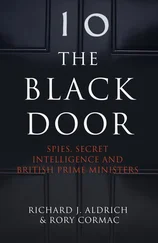As they drifted away from the action the depth charges fell further and further away from their position. In the control room everyone sat in silence, wondering what was next. Further shocks were not long in coming. They heard strange rasping sounds running down the side of the hull, followed by a ‘twang’ as if a wire had been caught and had then come free. Some thought the noises were caused by pieces of ice, but they then realised they had entered the minefield, and that it was the hawsers that attached the mines to the sea bed to keep them from floating away that were scraping the Turpin’ s sides. It was high time to cease drifting, set a course and pull away.
After a long run south they surfaced off the coast of Norway, and the crew inspected the damage. The periscopes and snorkel were grotesquely bent and completely unusable. Indeed, Turpin had been stripped of a large part of its extremities by the multiple blasts of the depth charges. Guardrails, aerials, the sensors and much of the tail fin had also been blown away. Most dramatically, the starboard outer casing had been torn apart, leaving a thirty-foot gash which in one place was three feet deep. However, the diesel engines were undamaged, and they headed for home, albeit with rather uncertain steering. Having lost their aerials, they could not communicate. Eventually they found a trawler out from Kingston-upon-Hull which relayed a message, allowing a rendezvous with a submarine depot ship, HMS Maidstone, which provided much-needed supplies of food and fresh water.
Returning to HMS Mercury, they were given a week’s leave. The four sparkers were then debriefed in person by Lieutenant Commander Harry Selby-Bennett, the Controller of naval sigint operations. After being briefly congratulated on a successful mission, they were told to their surprise that for reasons of ‘continuity’ of monitoring the Soviet transmissions they were about to board HMS Totem for a mission that would last another eight weeks. Understandably perhaps, Tony Beasley had now had his fill of submarines, which he had never volunteered for. Eventually he transferred to the Provost Branch, the Royal Navy’s police service, to complete his naval service of sixteen years. 32
Until 1956, Cabinet Ministers remained blissfully unaware of Britain’s intelligence ‘incidents’, including the two perilous missions of HMS Turpin in 1955. As a result the British remained more relaxed about forward operations than their American counterparts. By contrast the American intelligence community strained on a tight leash held by the State Department, and indeed President Eisenhower himself. However, all that was about to change. In April 1956 a single strange episode in Portsmouth harbour ensured that the situation was quickly reversed. Thereafter, growing hesitancy in Whitehall shifted the momentum in the world of sigint special operations away from Britain towards the United States. The turning point was the infamous ‘Buster’ Crabb incident. This offered Cabinet Ministers a first-hand glimpse of the sheer scale of political embarrassment that could be generated by bungled surveillance operations.
In April 1956 the Soviet cruiser Ordjoninkidze carried the Soviet Premier, Nikolai Bulganin, and Nikita Khrushchev, leader of the Soviet Communist Party, on a goodwill visit to Britain. Despite some robust exchanges between the Soviets and Anthony Eden, Churchill’s successor as Prime Minister, the visit went well, and the Soviet delegation departed on 27 April 1956. However, even as it left the press had begun to speculate about the mysterious disappearance of a British naval diver, Commander Lionel ‘Buster’ Crabb RNVR, in the vicinity of the visiting Soviet cruiser. Fourteen months later, in June 1957, a headless and handless body in a diving suit was recovered from the sea near Pilsey Island in the English Channel. Over the years, lurid tales of possible KGB abduction or beheading have circulated. However, newly released intelligence files show that Crabb was almost certainly killed by being drawn through the ship’s propellers. Churning the propellers at intervals was a standard defence against inquisitive divers whose presence was regularly suspected during such visits.
Buster Crabb had been the lead man on ‘Operation Claret’, an attempt by SIS to gain intelligence from the underwater inspection of the cruiser. He was one of the Royal Navy’s most experienced divers, and despite being demobbed in 1948 he was often recalled to help with difficult dives, including rescue work on submarines lost in accidents. Even at this early stage of the Cold War, such secret operations required political approval. But in this instance the system had broken down. The SIS officer who was tasked with securing the clearance for Operation Claret had suffered a family bereavement and had left the office before it had been obtained. His colleagues presumed that the green light had been given, but in fact it had not. The first rule of intelligence management – having political clearance – had been broken, and the cost for the whole British intelligence community was high. 33
What mattered to Eden was the public furore and the humiliation he suffered in the House of Commons. Not only had SIS bungled an unapproved mission, it also failed to cover its tracks. Despite the clumsy efforts of the local Special Branch to hide the evidence, including ripping out pages from the register of the hotel where Crabb had stayed, the press was soon on the trail. Journalists quickly established that this was an SIS mission, and that no ministerial authority had been given. Hugh Gaitskell, the leader of the opposition, enjoyed taunting his opponent on the issue. Eden was furious and decided to take disciplinary action, telling the Ministers concerned to order their staff to cooperate fully with the ensuing investigation. This process cast a long shadow over all the intelligence agencies, and ushered in an era of closer political control over special operations of every kind. 34
The head of the inquiry, Sir Edward Bridges, a somewhat nineteenth-century figure, employed the JIC to help him ferret out all aspects of the Crabb incident. As a former Cabinet Secretary, Bridges identified ‘certain questions’ of a broader nature. While intrusive intelligence operations clearly had a capacity to cause international repercussions, the systems for their authorisation were unclear. 35 Bridges recommended a broader inquiry reviewing all of Britain’s strategic intelligence and surveillance activities, and assessing ‘the balance between military intelligence on the one hand, and civil intelligence and political risks on the other’. Eden gave this job to Sir Norman Brook, the current Cabinet Secretary, working with Patrick Dean, Chairman of the JIC. 36 This review had immediate consequences for intelligence. In April 1956, coinciding with Khrushchev’s visit to Britain, some of the first examples of the CIA’s high-flying U-2 spy planes had arrived at RAF Lakenheath. These aircraft were mostly known for their work with high-altitude photography, but some of their missions were also sigint-orientated. Eden now decided that this, and a host of other special operations, had to stop, and the U-2s were sent to alternative bases in Germany. 37
Eden’s angry response had some unintended benefits. In 1952 Sir Stewart Menzies, Chief of SIS, had retired and was replaced by General Sir John Sinclair. The mediocre Sinclair had previously been Director of Military Intelligence, and while he was more competent than his predecessor, he was not a moderniser. He was now fired as a result of the Crabb incident; after the multiple inquiries he was pleased to go, and confessed to a friend in the sigint community that things were ‘getting too hot for me’. In the summer of 1956 Eden plumped for Sir Dick White, hitherto the Director General of MI5, as the new Chief of SIS.
Читать дальше












